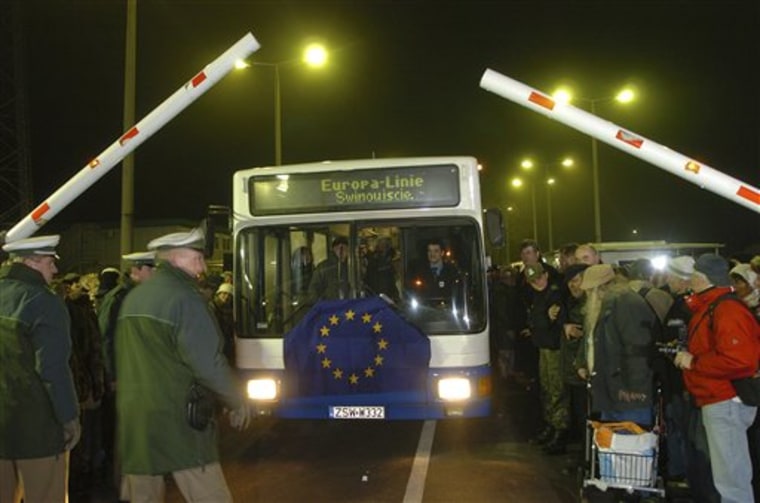European leaders celebrated Friday as the borders of nine countries along a Cold War frontier melted away, allowing a huge expansion to the EU's passport-free travel zone.
In Zittau, on Germany's eastern fringe — where the country meets Poland and the Czech Republic — Chancellor Angela Merkel, Polish Prime Minister Donald Tusk and European Commission President Jose Manuel Barroso raised a border gate as children set loose dozens of blue balloons covered by stars — symbolizing the EU flag.
"We are all quite happy to be able to celebrate this truly historic moment together," Merkel said as a crowd of onlookers cheered loudly.
Barroso held an old border crossing sign, calling it an archaeological relic.
Poland, Hungary, the Czech Republic, Slovakia, Slovenia, Estonia, Latvia, Lithuania and Malta joined the EU in 2004, but could not be part of the Schengen frontier-free zone until now because their police and border guards were not considered in line with EU norms.
With funding from their richer neighbors, they have introduced tighter controls but a German minister warned that the loss of border checks from the Baltic Sea to the Adriatic was happening too fast.
"It would have been better to wait a year or two longer to abolish the border controls," said Joachim Herrmann, the interior minister of the German state of Bavaria, which borders the Czech Republic. "It's all a matter of how well-protected the border is from Belarus to Poland, from Ukraine to Slovakia."
Bulgaria's Foreign Minister Ivailo Kalfin said Friday his country will be ready to join the Schengen zone by 2011.
"The realistic date for entering the Schengen area is 2010 or 2011," Kalfin said. "It depends, of course, on how prepared Romania will be, since it would be strange for Bulgaria to join, but to have a Schengen border with Romania."
Bulgaria and Romania joined the European Union in January but Romania has set a later date for its entry.
Polish PM hails 'exceptional' day
On the Polish side, in Porajow, Tusk said the day was "exceptional" for the Poles, Germans and Czechs who came of age in a divided Europe.
"Putting an end to border controls ... gives us a deep conviction that Europe's bad time — the division in our minds, in our hearts and on the borders — is definitely in the past," he said.
Hours before the controls ended at midnight Thursday, Polish and German officials gathered at the Frankfurt an der Oder border crossing, east of Berlin, cutting a symbolic ribbon.
After the border was opened there were fireworks and cheers, along with the sounds of Beethoven's "Ode to Joy."
Austrian leader dismisses concerns
But the move has also forced the EU to tighten controls on its new eastern borders to prevent infiltration by criminal gangs, illegal immigrants and even terrorists.
The EU's front line in the fight against illegal immigration remains to the south where thousands of poor Africans make a hazardous sea journey to the coasts of Spain, Italy, Malta and Greece, while would-be migrants from the Middle East and Asia take the overland route through Turkey and the Balkans.
Austrian Chancellor Alfred Gusenbauer dismissed concerns that the expansion would aid criminals or illegal immigrants as he symbolically joined Slovakia's Prime Minister Robert Fico to saw through a barrier on the countries' border.
"Schengen is not crime, not insecurity, not fear," Gusenbauer said. "Schengen stands for freedom, security and stability."
A new Iron Curtain?
The Schengen agreement is named after the village in Luxembourg where it was signed in 1985 by France, Germany, Belgium, Luxembourg and the Netherlands to allow citizens to travel freely between them. Since then, they have been joined by Italy, Spain, Portugal, Greece, Austria, Denmark, Sweden and Finland, as well as non-EU nations Norway and Iceland.
Many in Serbia however expressed concern that the expanded Shengen zone has left them trapped on the wrong side of a new Iron Curtain.
Beginning Friday, Serbian citizens need the EU's Schengen visas to travel to neighboring Hungary, or even to Slovenia — the country they shared the old six-republics Yugoslav federation with until 1991.
"That obviously means further isolation and more hassle for us who want to travel," said Jasmina Djukic, a 22-year-old university student as she went to the Austrian Embassy to apply for the visa.
"It feels like the Iron Curtain is back, with Serbia stuck inside and not outside like before," said Dragan Spasic, 41, an electrical engineer.
Serbia's pro-Western officials hope that Serbia could by 2009 be placed on the so-called "white Schengen list" that would allow its citizens to travel visa-free, like Hungarians, Bulgarians and Romanians were allowed to do long before their states became EU members.
But because of its perennial political instability, and fears that Serbs would flee en masse to the West if the visas were lifted, the EU has kept the requirement — although some categories, such as students, researchers, business people and journalists will be able to obtain visas to the EU more quickly as of Jan. 1.
